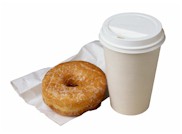


It seems that just about every day there's another report warning about the dangers of something that we previously believed wasn't causing us any harm. All of a sudden it's bad! And not just bad, but so hideously terrible that if we don't stop using it immediately (i.e., yesterday), we are destined for an agonizing, horrible, slow death.
Well, you know what? I really don't care.
“Why does he have this cavalier attitude?” you may ask yourself. Why indeed, dear reader? Okay, I'll tell you. First we are conceived. Then comes the delight of birth, the angst of youth, our “prime time” years, and old age. Then we die. It's pretty simple, really. Everybody does it. And it's a foregone conclusion that at some time or other, we are all destined to meet our Maker, no matter how we conduct our lives.
Now, I'm not disputing the fact that what we ingest into our bodies has a direct impact on our longevity. But why is it that The Experts feel it necessary to first pump us up about the potential benefits of various products, and then in the next breath, warn us of the inherent dangers of the selfsame products?
A great example of this is coffee—or more specifically, the caffeine it contains. Remember the dire warnings? "Do NOT drink coffee. It contains large amounts of a dangerous substance, caffeine, which in laboratory experiments has been shown to cause nervousness and increased blood pressure, put undue strain on the heart, decrease the libido, blah, blah, blah."
To be honest with you, I'm not surprised. If I were a lab rat and had ingested the equivalent of 30 cups of espresso, my heart would be pounding, too.
What did we do? Like good little automatons, we switched to decaf, as instructed. But hold on a minute before you order that double-tall decaf latte: what's this?
It's another report--put out by the same bunch of experts---warning us about the dangers of drinking decaffeinated coffee. It seems the chemicals involved in the decaffeination process have been found to be equally dangerous.
Well, that's just marvelous. What the hell am I supposed to drink now?
I suppose I could always go back to tea.
--Oh no, can't do that. Tea contains more caffeine than coffee. And don't forget that tea also contains tannin, which is just bad as caffeine, if not worse. So no matter which way you look at it, you're well and truly up the creek without a paddle.
What I've decided to do is just throw caution to the wind, and continue to enjoy my chosen beverage. (I was contemplating taking a sixpack to work instead of a flask of tea, but I thought that might not go down too well with management.)
Mind you, though, beverages containing caffeine are merely the tip of the iceberg. There have been equally dire warnings about milk--whole or skimmed, low fat, full fat, no fat, even stuff that contains only trace elements of milk. "Don't drink that, dear. Government scientists have said that it will make hair sprout on the palms of your hands."
Okay, then, if I can't drink anything containing caffeine, and milk will cause me to break out in spots, and soda is out of the question, how about water?
Well, yes, maybe that's okay. But don't forget that it has to be bottled water, because water out of the faucet contains too much calcium.
--Now, hold on a minute! I thought we needed calcium in our diet to stop our bones from getting brittle as we age.
Ah, yes, that's true. But too much of that is bad for you as well.
We have thus ascertained that no matter what we drink to quench our thirst, it has to come with some kind of government health warning.
Maybe what the experts should do is just put a warning label on all consumer products. "DANGER: No matter what you ingest into your body, it is going to be really, really bad for you."
Sometimes you just can't win.
